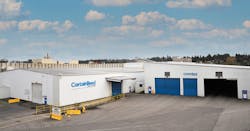Saint-Gobain sub installing Heat Exchanger at Vancouver gypsum wallboard plant
CertainTeed Canada Inc., the building products subsidiary of Saint-Gobain, will invest approximately C$4 million ($3.2M U.S.) at its gypsum wallboard plant in Vancouver for the installation of heat recovery technology.
During the production process, the gypsum wallboard has to pass through a large heated dryer to solidify the board and eliminate any moisture. Saint-Gobain will install a large heat exchanger on its industrial dryer that will capture and recycle some of the heat emitted from the dryer. This will enable the plant to maintain the temperature of the dryer and consume less energy.
It will reduce CO2 emissions at the plant by 10% and improve energy efficiency, the company said.
“We know that part of being a good business is being a good neighbor – and we will continue to strive to lead our industry towards a more sustainable future,” CertainTeed Canada CEO Richard Juggery said. “This project will help our company maximize our positive impact, for our customers and the communities where we do business, while minimizing our environmental footprint.”
The project will also receive C$1.4 million ($1.1M U.S.) from the CleanBC Industry Fund program, which provides government funding for clean technologies for industries.
The heat recovery project in Vancouver follows several other recent actions taken by the company to solidify its commitment towards sustainability:
Earlier this month, Saint-Gobain announced that through its virtual Power Purchase Agreement with the Blooming Grove Wind Farm in McLean County, Illinois, and additional renewables contracting, the company received renewable energy certificates that effectively reduced approximately 33% of its CO2 emissions from electricity usage in 2021 in the United States and Canada.
In February, the company invested $32 Million to upgrade equipment at its insulation plant in Chowchilla, California, reducing the facility’s carbon footprint by more than 4,000 metric tons per year.
In January, Saint-Gobain North America donated a zero energy ready house in Canton, Ohio, made with more than 20 of its own products, to Habitat for Humanity.
About the Author
EnergyTech Staff
Rod Walton is head of content for EnergyTech.com. He has spent 17 years covering the energy industry as a newspaper and trade journalist.
Walton formerly was energy writer and business editor at the Tulsa World. Later, he spent six years covering the electricity power sector for Pennwell and Clarion Events. He joined Endeavor and EnergyTech in November 2021.
He can be reached at [email protected].
EnergyTech is focused on the mission critical and large-scale energy users and their sustainability and resiliency goals. These include the commercial and industrial sectors, as well as the military, universities, data centers and microgrids.
Many large-scale energy users such as Fortune 500 companies, and mission-critical users such as military bases, universities, healthcare facilities, public safety and data centers, shifting their energy priorities to reach net-zero carbon goals within the coming decades. These include plans for renewable energy power purchase agreements, but also on-site resiliency projects such as microgrids, combined heat and power, rooftop solar, energy storage, digitalization and building efficiency upgrades.
